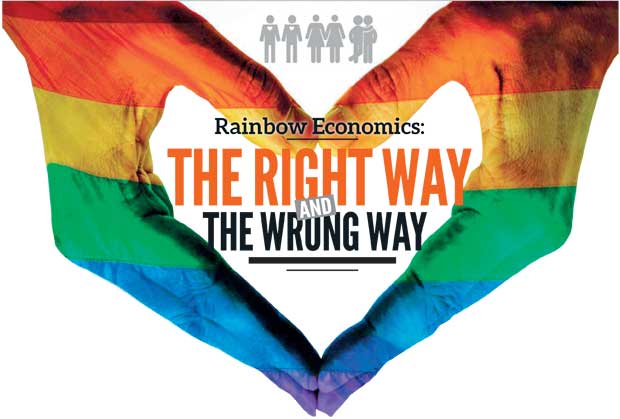Reply To:
Name - Reply Comment
Last Updated : 2024-04-18 07:50:00

The discrimination originating from these phobias not only hurts people, but also destroys families, workplaces and societies. It leaves a negative impact on the national economy of a country, although many may deny this assertion.
Allowing the existing laws to criminalise citizens based on their sexual orientation and gender identity is senseless and useless. These discriminations are clearly a waste of valuable human potential on a grand scale.
There is clear evidence that when societies enact such laws, they prevent productive people from  fully participating in the workforce, leading to economic implosion.
fully participating in the workforce, leading to economic implosion.
According to research of the issues faced by the world’s LGBTIQ population, Homophobia and Transphobia can lead to loss of employment, workplace or educational discrimination, poor health, and poverty which makes a fairly large section of the population – as much as 10% in Sri Lanka - non participants in the overall GDP growth of the country.
The continued invisibility of an LGBTIQ population, particularly in the developing world, means research remains a challenge. But, even with the existing data and analysis, there is ample evidence to prove that there is so much more to gain economically for Sri Lanka if we embrace diversity and stop marginalising the LGBTIQ community. Despite this understanding, Sri Lanka continues to marginalise this community through archaic laws such as section 365 and 365A of the Sri Lanka Penal Code, criminalising them for sexual activities conducted in private among consenting adults. Thus, decriminalising not only breaks the social barriers but allows these men and women to be a proud part of the national economic growth and enjoy its benefits – just like all other citizens.
Violation of human rights is likely to have a harmful effect on a country’s level of economic development.
According to a report published by the World Bank in 2013, discrimination towards the LGBTIQ community of India cost the country billions of dollars in lost revenue. Quoting Ashish Patel from the Wall Street journal, “Homophobia in the workplace in India and lost productivity as a result of discrimination are among some of the findings in a report by U.S.- based economist M.V. Lee Badgett that is part of an upcoming study for the World Bank. Ms. Badgett’s study also looks at how homophobia triggers high rates of depression and suicidal behaviour, which can also affect the economy. With this, Ms. Badgett estimates that homophobia cost India’s economy between 112 billion rupees ($1.9 billion) and 1.7 trillion rupees ($30.8 billion) in 2012. To put that figure into context: India lost between 0.1% to 1.7% of its potential gross domestic product that year. (http://blogs.wsj.com/indiarealtime/2014/06/10/how-homophobia-hurts-indias-economy/)
While no such study has been conducted in Sri Lanka, we can learn from the experiences of our closest neighbour India. The Question is – should Sri Lanka continue to copy its unfortunate neighbour or should Sri Lanka be the beacon, the leader in paving the way for LGBTIQ citizens to be productive, contributing citizens? As we struggle to gain our economic strength after many years of war and economic down-trends, should we not stop a moment to think how we can stride forward without constantly going backwards?
There is much to gain and nothing to lose by accepting and embracing Diversity in all forms in this country. So, what really is at stake here. Why should we be so concerned about nearly 10% of this country and what it can bring to the table?
According to Nielsen “The LGBT community is a significant contributor to the U.S. economy, and savvy companies should plan their strategies accordingly. “ (Http://www.nielsen.com/us/en/insights/reports/2015/proudly-setting-trends-the-2015-lgbt-consumer-report.html). The Business Insider states that LGBT persons spend more than US$800 billion annually in the US. It is, for many companies, a still largely untapped demographic that they are keen to start tapping.
Here are just a few statistics which give a picture of LGBT consumers and the differences in spending power of gay households vs. the American general market: (http://www.businessinsider.com/lgbt-community-untapped-market-consumer-brands-2013-6)
According to the U.S. Department of Commerce, it is estimated that LGBT travel generates over $65 billion annually in the US alone. (http://www.marketingmag.ca/wp-content/uploads/2012/06/LastQ_LGBT_0612)
More and more companies worldwide are adopting policies to safeguard LGBTIQ in the workplace. These companies know that LGBTQ equality isn’t just the right thing to do, it makes them stronger in the global economy. Ensuring fairness in the workplace is a value and increasingly a policy norm, and not just in the U.S. or Canada or the UK. Now, many businesses have embraced both sexual orientation and gender identity employment protections for their global and local operations.
It is very unfortunate that very little research exists in the developing world to support the argument that LGBTIQ persons in the workforce can only enhance and uplift our economy in a way that is essential to a country such as ours. We can refute the obvious, we can choose to ignore data from other countries but choosing to ignore what is in front of us only leads to increasing deprivation than bounty.
More access to rights, more protections under the law, more access to proper education and training – this will contribute greatly to LGBTIQ persons achieving their full economic potential and thus contributing to the coffers of this country in taxes and spending value. Just think how much in taxes we can collect from 2 million more people in the workplace? This is just the beginning in calculating what a financial bonus it will be once we decriminalise homosexuality!
So many countries are now embracing modern economic concepts such as strategic modernisation and prefer to use LGBTIQ rights strategically to promote and expand economies.
Since independence, Sri Lanka has boasted about evolving as a vibrant modern economy. Yet, years and years of discrimination, conservative religious extremism, racism, and misogyny has kept our country chained to development aid and handouts. We will eternally be a ‘developing’ country with no hope for the marginalised. The real question is, whether everyone can equally enjoy the benefits of national economic development in a country like Sri Lanka. The answer is, unfortunately not. It seems that only a handful of persons in the ‘right’ places can do so while citizens belonging to social minorities such as the LGBTIQ community, continue to be discriminated against and marginalised. It is very strange that successive Governments choose to use the whip instead of the feather to modernise this country while still clinging on to archaic laws and practices and conservative mind sets that only serve to drag our country backwards rather than striding forward - rich in diversity and vibrant with hope and vision.

Add comment
Comments will be edited (grammar, spelling and slang) and authorized at the discretion of Daily Mirror online. The website also has the right not to publish selected comments.
Reply To:
Name - Reply Comment
On March 26, a couple arriving from Thailand was arrested with 88 live animal
According to villagers from Naula-Moragolla out of 105 families 80 can afford
Is the situation in Sri Lanka so grim that locals harbour hope that they coul
A recent post on social media revealed that three purple-faced langurs near t

10 Apr 2024
09 Apr 2024